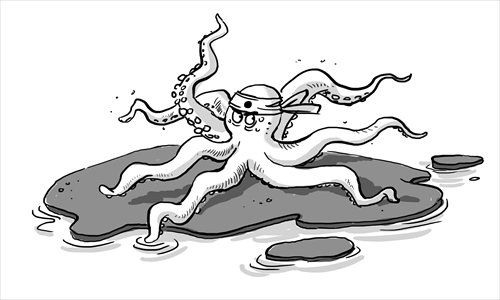ARI in the Media
[환구시보 (Global Times) 2012. 10. 31] Korea, Japan bound by dispute and dialogue
2012.12.06 64358

All of a sudden, Japan finds itself in conflict with neighboring countries on all sides over the territorial jurisdiction of small islets at the periphery of the Japanese archipelago.
The current situation is reminiscent of the prediction by Aaron Friedberg, a Princeton professor, soon after the end of the Cold War, that East Asia, lacking in institutions governing the region, was "ripe for rivalry."
It appears that his prediction has come true, albeit belatedly, because of the shifting balance of power, expedited by the rise of China, the newly assertive South Korea and Russia, and a relatively declining Japan.
In August, South Korean President Lee Myung-bak made a surprise visit to Dokdo, called Takeshima in Japan, which is a set of islets locked in a territorial dispute since the end of World War II. After the unprecedented visit, the Japanese government protested by recalling its ambassador from Seoul and running advertisements in major Japanese newspapers claiming that the islets belong to Japan.
Some observers said that Lee, virtually a lame duck, with his term due to end early next year, needed a boost to his popularity and an identity whitewash.
Lee has been portrayed as a pro-Japanese politician especially after his government was forced to postpone the signing of the General Security of Military Information Agreement in late June, which aimed to facilitate the exchange of military secrets between South Korea and Japan. By appealing to deep-seated nationalism and anti-Japanese sentiments, Lee was trying to burnish his image.
Others claimed that Lee's trip to the islets has been a response to the policy shift of the Japanese government, headed by Prime Minister Yoshihiko Noda, regarded as a rightist. Japan angered South Korea by making territorial claims to the islets in its latest defense white paper.
Furthermore, it was reported that the South Korean government, which had shunned official dialogue with North Korea for the past several years, resented the Noda administration's move to resume official negotiations with North Korea.
Following the Red Cross talks over the repatriation of the remains of Japanese who died during World War II, the Japanese government resumed working-level official talks with North Korea in four years amid indications that the young North Korean leader, Kim Jong-un, wants to improve economic relations with Japan.
Given the escalation of the tension over the disputed territories with South Korea, China and Russia, Japan appears increasingly isolated in East Asia. However, this is just one side of the coin.
One miraculous set of mechanisms which have helped to maintain peace in East Asia after the end of the Cold War are the thermostat-like norms of regional governance which have minimized the spillover of political disputes into the economic and social arenas.
This time again, Lee and Noda shook hands and held a brief talk at a summit of the APEC forum in Vladivostok in September, helping to cool down the tension between the two countries.
In fact, the APEC summit is one of several occasions in which the two leaders are supposed to meet annually. The others are the ASEAN Plus Three and the Trilateral Summit involving the leaders of China, Japan and South Korea.
When former Japanese prime minister Junichiro Koizumi paid a tribute to the Yasukuni Shrine, which accommodates 14 Class-A war criminals along with other war dead, the Chinese government refused to hold a bilateral summit with the Japanese leader for several years. However, the community-building initiatives in East Asia have made significant progress during the past decade, making it virtually impossible for a leader to boycott a series of official annual meetings.
The US has long wanted to see a strengthened security relationship between Japan and South Korea, as its two East Asian allies have previously failed to form stable political and military ties.
Since the eruption of the dispute over territorial issues, US Secretary of State Hillary Clinton and other officials pressed them to restore their relations, vital for the US policies to check the rise of China.
Responding to the US request, South Korean Foreign Minister Kim Sung-hwan and Japanese Foreign Minister Koichiro Gemba met in Vladivostok and agreed to work closely to jointly handle regional and international issues, including North Korea.
Bilateral relations between Japan and South Korea will remain volatile for the time being, because the territorial issue and the diverging interpretations of Japan's past actions will continue to irritate the friendly ties between the two countries.
Nevertheless, the built-in norm of "separation of economics from politics" and the progress of institutionalization of bilateral and multilateral relations will help to maintain an uneasy stability.
The author is a professor at the Asiatic Research Institute of Korea University. opinion@globaltimes.com.cn





